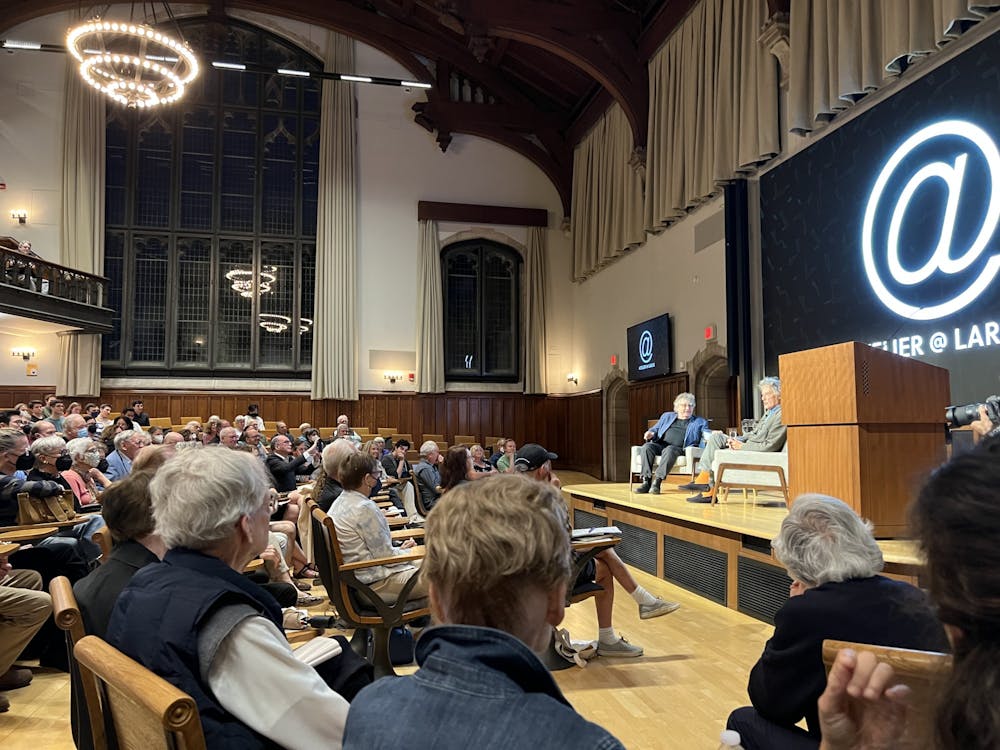Tony Award-winning playwright Tom Stoppard graced Princeton’s campus for a witty, thought-provoking hour of discussion on Thursday, Sept. 22. Stoppard joined creative writing professor and award-winning poet Paul Muldoon on the McCosh Hall 50 stage as a part of the Atelier@Large: Conversations on Art-making in a Vexed Era series.
Before Stoppard appeared onstage, the audience was already enthusiastic. Excited chatter filled the room, as those present waited eagerly to hear Stoppard’s thoughts and chatted about their experiences reading his plays as the last of the crowd took their seats.
The audience erupted in applause as Muldoon introduced the special guest. Stoppard soon joined the stage in noticeably bright orange socks, a subtle tribute to the students and alumni watching from the lecture hall’s desks.
“When we see socks like that, we assume that you’re wearing them in our honor,” Muldoon said.
The humorous banter continued for the large duration of the event. When asked about traveling to New York to support his new production, Stoppard said that he typically remained in his quaint town in England. “I don’t follow my plays around normally, at all,” he explained.
Stoppard’s welcoming, sometimes biting humor intensely drew the audience into the discussion. Between the comical anecdotes, Stoppard shared insights about the process of art creation, specifically in terms of producing and absorbing theater. Opening with his famous aphorism, Stoppard said, “Theater is not a text. It’s an event.”
In describing “Leopoldstadt,” Stoppard’s latest play, he discussed the creative freedom that art allows. He noted his autobiographical appearance in the play and described instances of breaking the fourth wall to fully connect with the audience.
As the discussion deviated from light-hearted stories to more serious topics, Muldoon asked questions that harkened back to the title of the series: “Art-making in a Vexed Era.”

Stoppard also touched on his views on current politics, especially in Russia, and the fractured state of the world. He emphasized the power of art to overcome divisiveness and the rigid rules of our modern world.
“Art is a kind of denial of the physical world, and the political world is the physical world,” said Stoppard, explaining that Anton Chekhov’s birch trees, three sisters, and seagull would all survive the evolving politics of Russia.
The evening closed with questions from the audience, and the humorous tone that first captured the audience returned. Stoppard, who earlier in the evening shared his profound interest in science and math, was asked if he ever received positive feedback from academics for including their studies in his plays. In response, Stoppard recounted an amusing exchange between him and the mathematician Barry Mazur over some inaccuracies in one of Stoppard’s plays. Even though “theater is an empirical art form,” Stoppard said, he couldn’t quite bring himself to rewrite the relevant section of the play and happily accepted Mazur’s forgiveness instead.
Stoppard also described his preference for abstract ideas over building characters. Later, he recounted his experience improving the dialogue for Sean Connery and Harrison Ford for an “Indiana Jones” film. His amusing answers connected with the audience, as they leaned forward, stifled laughter, and erupted in spontaneous applause.

Muldoon closed the evening with a reminder of Stoppard’s brief stint as a scriptwriter: “I think all our dialogue would be improved if you had a hand in it.”
Isabella Dail is a member of the Class of 2026 and a Contributing Writer for The Prospect at the ‘Prince.’ She can be reached at id7289@princeton.edu.








